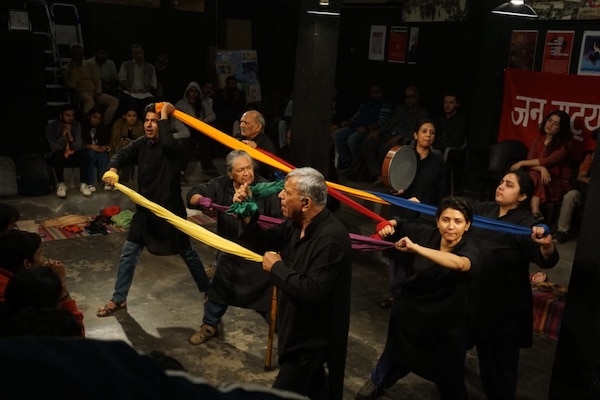Dear friends,
Greetings from the desk of Tricontinental: Institute for Social Research.

A Red Books Day event at The People’s Forum in New York City (United States), 2024.
It is nearly impossible to think of joy while Israel continues its genocidal violence against Palestinians and while the terrible war escalates in the eastern flank of the Democratic Republic of the Congo (DRC). Tens of thousands of people have been killed and injured and millions displaced in Gaza and near Goma (DRC). In both these places, the immediate demand must be to end the violence, but rising alongside it is the need to end the root of this violence (such as ending the occupation of Palestine). When there are conflicts of this kind, we get trapped in the present, unable to think about the future. Increasingly, the deterioration of everyday life, with famine stalking large parts of the planet, has made it impossible to dream of another world. The demands from Gaza, Goma, and tens of thousands of places across the word are the same: one less bomb, one more piece of bread.
Even in the bleakest times, however, humans seek joy and promise, looking for a horizon that is not merely framed by the immediate indignities of life. Nearly a decade ago, I spent an afternoon at the Jalazone camp, north of Ramallah (Palestine), where I attended a session at a United Nations Relief and Works Agency (UNRWA) school. Outside the UNRWA school, in the West Bank, the quotidian tension of the occupation was sharpened by a series of killings of Palestinians by Israeli soldiers at checkpoints.
In an art class at the UNRWA school, I watched young Palestinian children draw a story depicting a recent dream they had. The teacher allowed me to walk around the classroom and interact with the children. Many of them drew what children often draw: a house, the sun, a river beside the house, children playing on a swing or a slide. There were no signs of apartheid walls, no checkpoints, and no Israeli soldiers. Instead, there was merely the simplicity that they wanted to experience. This is how they portrayed happiness.

A Red Books Day event at the Simón Bolívar Institute in Caracas (Venezuela), 2024.
Now, when I ask my friends in Gaza about their children, they say that the sound of the war, the dust of the bombed landscape, and the fear of death envelops them. Saleem, in Rafah, says that his two young daughters often sit on the floor of their uncle’s apartment, drawing on any scrap of paper they can find. ‘Next year’, he says, ‘we will do Red Books Day in Gaza City, inshallah’. ‘What book will you read’? I ask him. ‘For you’, he said, ‘we would read Darwish, the great Palestinian poet’. And then, he recites these lines, from the poem ‘Memory for Forgetfulness’:
What are you writing in this war, Poet?
I’m writing my silence.
Do you mean that now the guns should speak?
Yes. Their sound is louder than my voice.
What are you doing then?
I’m calling for steadfastness.
And will you win the war?
No. The important thing is to hold on. Holding on is a victory in itself.
And what after that?
A new age will start.
And will you go back to writing poetry?
When the guns quiet down a little. When I explode my silence, which is full of these voices. When I find the appropriate language.
Israeli jets had begun to bomb the edges of Rafah, and yet Saleem took time to talk about Red Books Day. For him, as for his children, the present is not sufficient. They want to imagine what lies beyond the horizon, what lies beyond the unfolding genocide.
This year, from Indonesia to Chile, a million and a half people participated in Red Books Day, which is becoming a fixture on the calendar of the international left. In 2019, the Indian Society of Left Publishers began to look into holding a celebration on 21 February, the publication date of The Communist Manifesto in 1848. This book, one of the most widely read in the world, has inspired billions of people over the past century and a half to build a process of socialism that will transcend the stalled problems created by capitalism (such as hunger, illiteracy, poverty, genocide, and war). The book continues to inspire millions in our time, its words more relevant than ever to solving the struggles of the present.
Since this date is also shared by International Mother Languages Day, the idea was for writers, publishers, bookshops, and readers to go into public places and read the manifesto in their own languages. Despite the challenges posed by the pandemic, 30,000 people from Venezuela to South Korea participated in the first Red Books Day in 2020, with its epicentre in India. Soon, it became clear that the point was not to read the manifesto alone, but any ‘red book’ on that day. Engaging more deeply with left ideals, many decided to hold festivals of different sizes to rescue collective life and promote the cultures of the left.
This year, the International Union of Left Publishers (IULP) initiated Red Books Day festivities in early February with the release of a powerful dance video by the young artist and communist cadre Chemm Parvathy. She performed to the French version of ‘The Internationale’, dancing through the markets and workshops of the workers of Thiruvananthapuram. The song culminated with Parvathy at the beach, holding a communist flag as the red sun sunk into the horizon behind her. The video went viral and set the tone for Red Books Day. This year’s events were accompanied by a series of original commemorative posters designed by artists from around the world to encourage more and more people to organise readings and performances in their regions.

A Red Books Day event organised by the Socialist Movement in Accra (Ghana), 2024.
It was clear that the scope of events held in 2024 would eclipse our previous attempts given the width and depth of participation. Public events were organised by socialist forces in Indonesia and East Timor while the Havana Book Fair in Cuba set aside 21 February for a special day of events. Readings of red books were held by the Socialist Movement of Ghana and the Landless Workers’ Movement of Brazil (MST), as well as by Red Ant in Australia and the Workers’ Party in Bangladesh. Communists in small villages in Nepal convened meetings in the high mountains to discuss the importance of study and struggle. In New York City, The People’s Forum held a celebration on the life and writings of the communist Claudia Jones, while in Chile speeches of Salvador Allende were read at La Cafebrería and in South Africa a discussion was held at The Commune about how the imperialist powers use the concept of human rights. The Communist Party of Ireland organised readings and a workshop in the cultural centre Aonach Mhacha, and the UK Young Communist League and a group from the Students’ Federation of India organised a film screening of The Young Karl Marx at the University of Southampton.
Red Books Day is now rooted in the cultural landscape of India’s left. This year, Red Books Day also became a forum to commemorate the 100th anniversary of the death of V. I. Lenin, leader of the 1917 Russian Revolution. In Kerala, half a million people met to read and discuss EMS Namboodiripad’s Leninism and the Approach to the Indian Revolution in 40,000 places. The largest of these events was in Thiruvananthapuram, where Communist Party of India-Marxist, or CPI(M), Kerala State Secretary MV Govindan inaugurated the festival. The Purogamana Kala Sahithya Sangham (PuKaSa or the Progressive Arts and Literary Organisation) held seminars across Kerala on the contemporary relevance of the manifesto, and VKS Singers Group of the Pukasa Nattika Mekhala committee prepared a music video on The Communist Manifesto. In Karnataka, CPI(M) Politburo member MA Baby delivered a lecture on ‘Lenin and Culture’ while in Andhra Pradesh and Telangana, workers, peasants, and youth discussed Lenin’s life and writings (including through a webinar organised by Mana Manchi Pustakam).

A Red Books Day event organised by the Landless Rural Workers’ Movement (MST) in Brasília (Brazil), 2024.
In Maharashtra, a webinar was held on Godavari Parulekar’s Jevha Manus Jaga Hoto (‘The Awakening of a Man’). In many parts of India, such as Assam, the Students Federation of India organised readings of The Communist Manifesto. In both West Bengal and Tamil Nadu, people read the Bangla and Tamil editions of The Political Marx, written by Aijaz Ahmad and me. In the same state, G. Ramakrishnan of the CPI(M) inaugurated a reading session in central Chennai, and crowds read and discussed the short booklet Lenin: The Polestar of Revolution.
Students at Hyderabad Central University and The English and Foreign Languages University ran with the idea of turning the day into a broader cultural spectacle and organised a poster exhibition and a book festival. At New Delhi’s May Day Bookstore, there were songs and dances as well as a street play by Jana Natya Manch, readings of the manifesto in various Indian languages, and a poetry recital in solidarity with Palestine.
Building toward Red Books Day 2025, the IULP will release a poster on their social media channels every month that will culminate in a Red Books Day calendar at the end of the year. The idea is that Red Books Day will not only be about the day alone but will also be defined by activities through the year that build toward the main events on 21 February.
Red Books Day is part of the broad cultural struggle to defend the right to write, publish, and read red books and to fight against obscurantist ideas that stand in for reason these days (such as India’s Prime Minister Narendra Modi’s claim that ancient India excelled in plastic surgery because the Hindu Lord Shiva, who replaced the head of his son Ganesh with an elephant’s head, as we wrote in our latest dossier). Though Red Books Day is anchored by the IULP, which includes over forty publishers from around the world, it is not solely organised by the union. The general hope is that this day will go beyond the IULP and become a key part of the calendar of the left. It was remarkable to see Red Books Day spread beyond our left networks. This is precisely the objective of Red Books Day: for it to become an integral part of public culture and to struggle to establish rational and socialist ideas as the foundational ideas of society. By the end of the decade, we estimate that over ten million people will participate in Red Books Day. Next year, in Gaza.
Warmly,
Vijay

